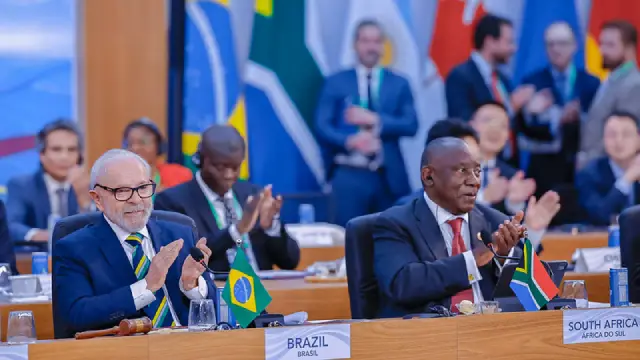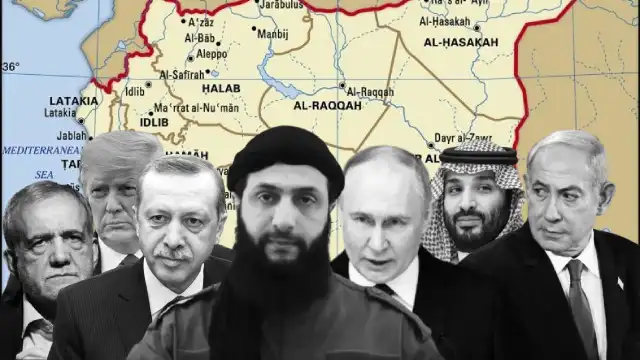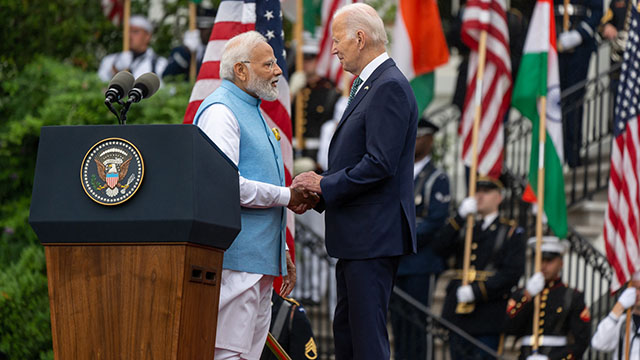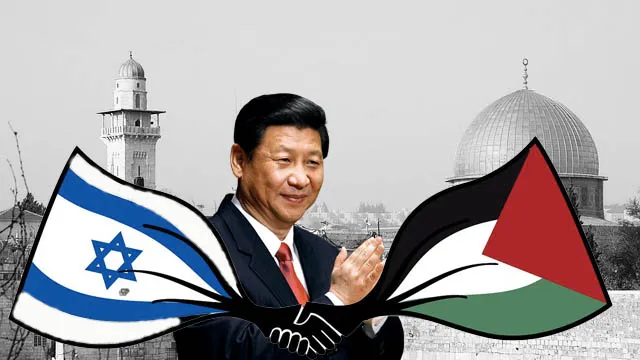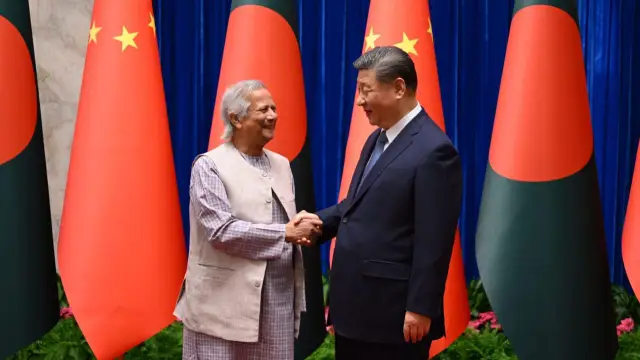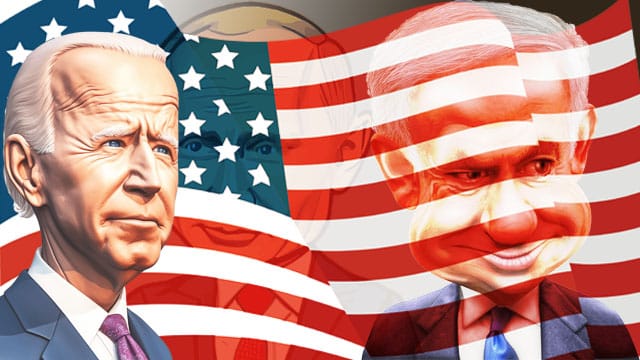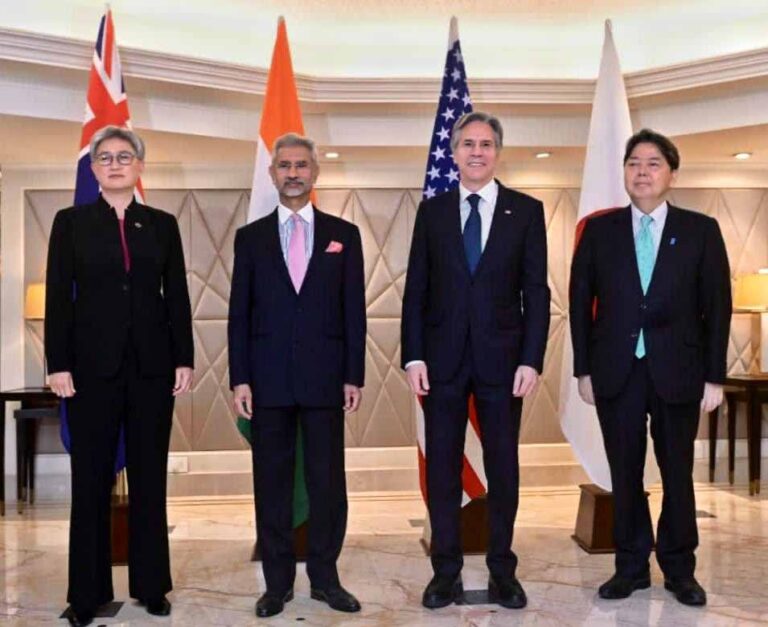The streets of Rio de Janeiro bore a different look in November 2024 vis-a-vis New Delhi in September 2023. Unlike Indian Prime Minister Narendra Modi’s gargantuan branding of the country’s chairmanship of the G20 Summit last year, Brazil’s preparations for the grand event were quite different. Except for the beefed-up security on the streets of Rio de Janeiro and occasional hoardings that greet visitors, it’d have been quite hard to understand that the city has been hosting G20 Summit 2024.
However, unlike New Delhi, the Rio de Janeiro G20 Summit 2024 has been largely fruitful, thanks to President Luiz Inacio Lula da Silva’s efforts to push the focus on poverty and hunger, issues that make the US-led collective West uncomfortable.
Rather than rhetoric, the G20 Summit 2024 has focused on resolving the burning crises affecting billions in the Global South.
Brazil’s focus on hunger and poverty
“The number of people facing hunger has increased, reaching the staggering figure of around 733 million people in 2023, with children and women being the most affected. These unprecedented challenges call for greater and more effective commitment, financing, and actions at all levels and sound economic policies to foster growth and job creation,” the Rio de Janeiro declaration highlighted.
Rather than turning the G20 Summit 2024 at Rio de Janeiro into a geopolitical battlefield, Mr Lula da Silva shifted the focus to hunger and poverty.
He criticised the US-led collective West for its indifference towards these issues.
“Hunger and poverty are not the result of scarcity or natural phenomena… they are the product of political decisions,” Mr Lula da Silva, the metalworkers union leader-turned-president, mentioned. “In a world that produces almost six billion tons of food per year, this (global hunger) is unacceptable,” Mr Lula da Silva added.
Following the tone set by the host country, the declaration read, “The world produces more than enough food to eradicate hunger. Collectively, we do not lack knowledge nor resources to fight poverty and defeat hunger. What we need is political will to create the conditions to expand access to food. In light of this, we have launched the Global Alliance against Hunger and Poverty and welcome its innovative approach to mobilizing finance and knowledge sharing to support the implementation of country-led, country-owned, large-scale and evidence-based programs aiming at reducing hunger and poverty worldwide (sic).”
The G20 Summit 2024 also raised the alarm over the fact that with nearly five years left for the United Nations’ Sustainable Development Goals (SDG) 2030, “progress towards only 17% of the SDG targets is on track, nearly half are showing minimal or moderate progress, and progress on over one third has stalled or even regressed (sic).”
Global South’s voice at G20 Summit 2024
The Rio de Janeiro declaration also ensured that the Global South’s voice was amplified rather than the West’s, highlighting that the G20 truly epitomised the former’s aspirations rather than those of the rich countries.
While in the 2023 New Delhi declaration, Mr Modi allowed a lot on Ukraine to be included, apparently in a bid to appease the West, in the Rio de Janeiro declaration, Mr Lula da Silva minimised the content on Ukraine, avoided bashing Russia and emphasised on reaching an immediate ceasefire in Gaza and Lebanon and the implementation of the “two-state solution”, causing further discomfort to the West.
“Specifically concerning the war in Ukraine, while recalling our discussions in New Delhi, we highlight the human suffering and negative added impacts of the war with regard to global food and energy security, supply chains, macro-financial stability, inflation and growth. We welcome all relevant and constructive initiatives that support a comprehensive, just, and durable peace, upholding all the Purposes and Principles of the UN Charter for the promotion of peaceful, friendly, and good neighborly relations among Nations (sic),” the G20 Summit’s declaration mentioned on Ukraine, without going any further.
However, at the same time, the Brazilian side, backed by South Africa and other Global South countries barring Argentina and India, highlighted the plight of Gaza prominently in the declaration, calling for precise actions, including adherence to the “two-state solution”.
“While expressing our deep concern about the catastrophic humanitarian situation in the Gaza Strip and the escalation in Lebanon, we emphasize the urgent need to expand the flow of humanitarian assistance and to reinforce the protection of civilians and demand the lifting of all barriers to the provision of humanitarian assistance at scale. We highlight the human suffering and negative impacts of the war. Affirming the Palestinian right to self-determination, we reiterate our unwavering commitment to the vision of the two State solution where Israel and a Palestinian State live side by side in peace within secure and recognized borders, consistent with international law and relevant UN resolutions. We are united in support for a comprehensive ceasefire in Gaza in line with UN Security Council Resolution n. 2735 and in Lebanon that enables citizens to return safely to their homes on both sides of the Blue Line (sic),” the declaration mentioned.
Through these, Mr Lula da Silva has exposed how a swift realignment of powers is taking place on a global scale and how the Global South countries, barring a few pro-West entities like Argentina and India, wholeheartedly aspire to decouple their growth story from the US-led West.
Responding to these changed circumstances, Germany’s pro-Zionist Chancellor Olaf Scholz said, “We are experiencing a major, major change in global structures,” adding, “These are countries that want to have their say. And they will no longer accept that everything will continue to be the way it has been for decades.”
This shift also highlighted how the US has been alienated in the global geopolitical arena with the resurgence of a new wave of nationalist sentiments in the countries of the Global South.
America’s ‘must go’ tragedy
The US has so far dictated who must go—leave the helm—in the international arena. However, the irony for the US is that all those leaders whom outgoing US President Joe Biden and his predecessors labelled as “must go”, continue to rule far more assertively, while the octogenarian is shown the way out of the White House.
A frail Mr Biden, left mostly alone at the Rio de Janiero summit, exhibited the current position of the US outside the spheres dominated by its loyalists.
Although the Brazilian officials believe strongly that Donald Trump’s ascension to presidency in the US will lead to major policy changes and can create obstructions for the G20 Summit’s vision on hunger reduction and combatting poverty, which even next year’s host South Africa has strongly supported, the situation has given a scope for the Global South to further decouple from the US-led “global rules-based order” bandwagon.
From calling out the names of Global South leaders with the “must go” suffix, it’s now the US that’s getting the “must go” message from the three continents.
Utilising the scenario and the US’s disarrayed condition, China has decided to strengthen its position in the Global South.
How China stole the G20 Summit 2024
Chinese President Xi Jinping stated eight points at the G20 Summit 2024, which highlighted China’s growing focus on deepening its engagement with the Global South countries, especially the least developed countries (LDCs) in Africa.
Among these eight points, Mr Xi stressed the September 2024 decision of the Customs Tariff Commission of the State Council to implement a zero-tariff policy on 100% of products originating from the LDCs with which China has diplomatic ties, effective from December 1st.
Under this policy, commodities from LDCs subject to tariff quotas will see the in-quota tariff rate reduced to zero, while the out-of-quota tariff rate will remain unchanged.
It puts China diametrically opposite to the Trump 2.0 regime’s exclusionary and protectionist policies, which will make the US market inaccessible to most Global South countries, including LDCs.
Making its market, which is larger in consumer base size vis-a-vis the US’s, accessible to the LDCs is China’s ‘trump’ card to wean away these countries from the West’s fold. This is something where Mr Trump can’t beat Beijing, despite his plans to block its access to high-tech chips and semiconductor designs.
China has also decided to join the Global Alliance against Hunger and Poverty.
In his speech, Mr Xi highlighted, “China supports the G20 in continuing to convene the Development Ministerial Meeting, and will stay a committed host of the International Conference on Food Loss and Waste.”
Apart from joining the hunger and poverty alleviation programme and allowing duty-free imports from LDCs, China has also stressed on making AI and science accessible for the poor countries. President Xi has noted that Beijing will play a key role in promoting Open Science, with Brazil, South Africa and the African Union to ensure better access to science and technology for the Global South countries.
At a time when the West is protective about its innovations and is lacking the technological prowess, China’s initiative in promoting Open Science and sharing innovations with the Global South can help change geopolitical equations in a big way.
It’s to be seen how the West tackles this challenge, as it lacks the resources, technology, capital and, above all, any will to help the LDCs in their growth stories.
The road ahead
The G20 Summit 2024 exhibited the resurgence of the Global South and its aspirations. It has brought some important positive changes that next year’s host South Africa promises to carry forward, including the concerns over food, poverty reduction and addressing the climate challenges.
Globally job creation in the post-pandemic phase has been a challenge, yet the governments across the world have been non-chalant in investing more towards job creation and has left the task with the markets, just like Argentine President Javier Milei or India’s Mr Modi, resulting in economic catastrophe and widening of wealth gaps in these countries.
It’s clear from the US and the West’s response, that they aren’t very happy with the way the Global South is taking its destiny into its own hands.
Even though Mr Trump’s second term will discard the declarations of crucial institutions like G20, it’s clear that the Global South won’t allow the discourse over food and hunger to die down amid a crisis. How the Global South countries will navigate the roadblocks erected by the US-led collective West and assert their demands, is something worth watching for the next few years.

